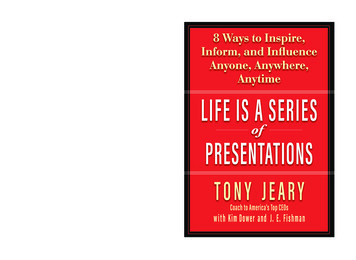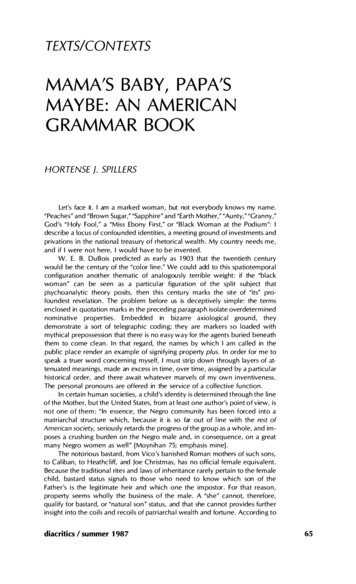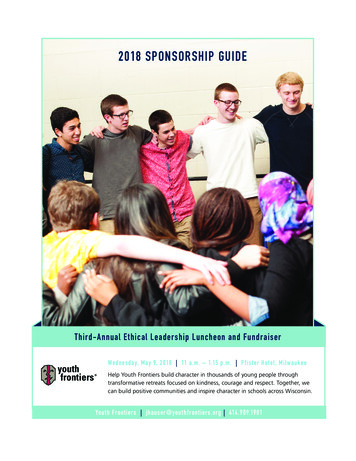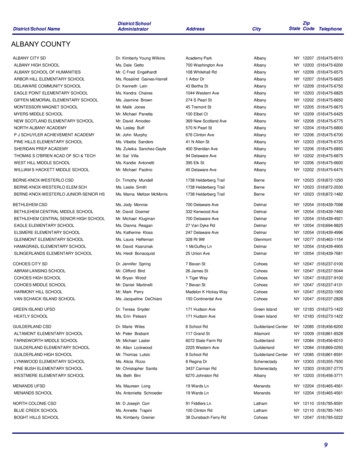
Transcription
70Amazing factsabout your brain.and why it does weird things.byTim Brownson
Copyright 2012Whereas this book is copyrighted, the facts obviously aren’t so please feel free tobore/entertain people at parties with them.You can reproduce sections of the book with my pleasure as long as you givecredit.You can also forward the book on to people who may like it with no need to askme and irrespective of whether you have paid for it.If you have the Kindle version via Amazon and would like multiple copies to giveto family or friends, simply e-mail tim@adaringadventure.com and I’ll send youa copy that you can then distribute.AcknowledgementsIt would be remiss of me not to thank the people that helped me with this booknot least of which are my blog and newsletter readers as well as my clients.Without all of you there would no point in me writing it!Thanks to Naomi Niles for design and Emily Metzloff for her awesome editing.She actually told me I could take out the typo reference at the beginning, butlittle did she know that I had a little bit of rewriting to do and may have addedsome back in. Sorry Emily!Also thanks go to Tony Teegarden for his help and support and Stacy Stone forsome great advice regarding the launch.
About The AuthorDon’t worry, I’m not about to go all 3rd person on you here and say stuff like“Tim Brownson is a highly sought after Life Coach with clients all over theworld blah blah blah.”It is true but I’m not sure you give a damn about that, so let me throw some bulletpoints out just in case you are interested in my background.Feel free to either read or scroll past at your leisure: I am a Life Coach and I have been working as one since late 2004. I did my certification training in the UK and went full time in May 2005 andhave since worked with hundreds of clients from all over the world. I am fairly well known for my work on core values and the process that Ideveloped to help get clients unstuck. I am also a certified Hypnotherapist and an NLP Master Practitioner (twiceover). I studied stress management at Sheffield University in the UK. I am the co-author of the book How To Be Rich and Happy, which has beenpublished in countries as diverse as China, Germany, Taiwan, Canada(Quebec), Netherlands and France. How To Be Rich and Happy is self-published in the US because we haveretained the rights and are using the money we make from sales to give freecopies away to good causes. At the time of writing we have distributed over 300,000 worth of hard copiesof the book. I have a very British sense of humor that hasn’t changed even though I nowlive in Central Florida. I’ve never met the Queen and no, I don’t know Bob from London or want a cupof tea, thank you very much.Thanks for reading, now on with some lovely brain stuff.
Foreword & DisclaimerI am not a neuroscientist, nor am I a brain expert; I am merely a Life Coach whois fascinated by the human brain, both its limitations and its amazing ability anduntapped potential.This book is for entertainment and to a certain extent educational purposes.Please do not remove your brain to see if what I am telling you is true; that wouldbe silly, almost as silly as emailing me to tell me you spotted a typo or two - dealwith it.I have done a lot of research to make sure the facts are indeed facts. However,it is possible that I may have stumbled on some bogus research. Doubtful, butpossible, so please don’t e-mail me to say that the brain can only last 9 secondswithout oxygen and not 10, just grin and bear it along with the typos.I have a tendency to swear. I know, I know, some people think it’s totallyunprofessional, but that’s just how it is. If it’s likely to offend you, please don’tread on because I don’t want you having palpitations. I realize I could take thefew offending words out, but that would be inauthentic and if you read my blogyou’ll know I try not to do inauthentic.If you find the following information useful or fun to read, I would love for you toforward it on to anybody that you think can benefit from it.If you have received this from a friend or family member, you can get moreof the same by going to my website and signing up for my newsletter. If youdo that, you will be sent free-of-charge ebooks on topics such as goal setting,motivational quotes and dealing with stress.You would also be a very welcome guest at the A Daring Adventure blog where Ipost about twice a week on self-development, life coaching, stress managementand anything else I can think of that I think will add value to your life or makeyou smile.
If you’re looking to hire your own life coach and take your life to the nextlevel, then please give me a call on 407 334 4692 or contact me at tim@adaringadventure.com. I can also be hired for public speaking in the samemanner.
Introduction - October 2012I’d love to start this introduction by saying that I’ve always been fascinated bythe human brain, but I can’t. In fact my interest didn’t really start until I startedtraining to become a Life Coach.Prior to then I realized people did dumb things (including myself) but I rathernaively put it down to bad luck or blind stupidity and nothing else.Until I started training in NLP (neurolinguistic programming) it never crossedmy mind that literally every decision we make is made with the best intentions.It’s just that sometimes a lack of information or a brain that can often seemto conspire against us, means that those best intentions can look foolish inhindsight and even cause detrimental results.Your brain is both amazing and quite frankly, stupid. It can create a feelingof danger and anxiety where none should really exist (giving a speech orpresentation is a great example), but equally it can warn you when danger ispresent when you were completely unaware of it at a conscious level.Your unconscious brain can literally manage hundreds of tasks simultaneously.It’s a plate spinning, ball juggling, multi-tasking genius. Yet your consciousbrain starts to struggle with more than a couple of things and your performancedegrades severely when you try and manage three or four things in yourconscious memory at once.The problem is, the newer part of your brain (the neocortex) which is responsiblefor planning, sensory perception, language, spatial awareness and consciousreasoning is in evolutionary terms, still very young. Whereas the reptilian part ofyour brain (the basal ganglia and part of the limbic system) has had a head start(no pun intended) of a couple of million years or more.That is why when you come under intense pressure, you will tend to revert toreptilian responses (fight, flight or curl up into the fetal position and do nothing)that often make no sense in a modern society which is by and large far safer thanwe are often led to believe by the fear mongering media.If you had met me at a party a decade or so ago, I’m sure you would have walked
away with the impression I was a bit of a miserable and pessimistic jerk. I wouldhave happily pointed out to you how much my well-paid job sucked, howstressed I was and how unfair life was.And your impression of me would hardly have been elevated if you had been ableto hear the conversations that were going on inside my head.I was giving myself a hard time most of the waking day. Every sale I closed meantI was lucky, and every sale I lost proved I was an idiot. And on the rare occasionsI wasn’t blaming myself, I was blaming others for my inability to be content andhappy with my life.Do you know there are over twice as many words in the English language fornegative emotions and feelings than there are for positive ones? And that’s notexclusive to the English language either because it cuts across all languages andall cultures.You could hear that and be forgiven for thinking that human beings are amiserable, pessimistic lot at heart, but there’s actually an excellent reason for theimbalance.As Homo Sapiens we have been sharing this planet with all sorts of creatures thatcan eat, sting, bite, and even electrocute us for the best part of 200,000 years.That’s only really changed in the last few hundred years with the explosivegrowth of mankind. The accompanying deforestation and expandingurbanization wiped out or marginalized entire species that may have previouslyposed a danger to our existence.As well as having to be wary of nasty creatures with big pointy teeth, we also hadto ensure we did not bump into enemy tribes or annoy our tribal elders or peersand risk a lowering of our status.The brain still thinks status is crucial to its survival because tens of thousands ofyears ago it was status that decided whether you got to stay in the tribe, who (orif) you could marry, and generally how secure and happy you were.These days somebody unfollowing you on Twitter can be seen by your brain as adecrease in status, as can being turned down for a date or losing an online roleplaying game. As such your brain can create a dopamine crash, and that’s whythose things tend not to feel good.
On the flip side, it can give you a pleasant dopamine rush by such things asgaining a promotion at work, getting your 15 minutes of fame on TV, and evensomething as seemingly inconsequential as winning a petty argument with afriend.Unfortunately for society as a whole, most people feel a strong, albeit short-lived,surge of status through the acquisition of wealth, material possessions, andpower too and I say unfortunately because that leads to greed and the lust forpower.We are living in remarkable times. It’s sometimes difficult to see as we are soclose to it, but there’s little doubt that we are going through a technologicalrevolution no less impressive than the previous industrial and agriculturalrevolutions.There is one massive drawback with all this rapid change though.It’s your brain.Unfortunately your brain cannot evolve at the same rate as technology without alot of help from you utilizing tools like meditation and mindfulness.That’s because its default behavior is to cling on to the old way of doing thingseven when at a rational and conscious level your actions sometimes make little orno sense.As I mentioned, your brain can, and often will, throw you into the fight or flightresponse even though you’re only asking for a date or giving a presentation.It can urge you to carry on eating even when you are full because it doesn’t knowwhen you will next hunt down dinner and/or you have developed a pattern ofbehavior from childhood after being told again and again to clear your platebecause there are starving kids in China.It can also create fears around people, animals, and inanimate objects that areoften completely irrational at a conscious level. And I have to admit that I havebeen the “victim” of all of the above, courtesy of my prehistoric brain.There is little correlation between income and happiness when somebody earnsover 100,000 per year. And what correlation does exist almost completelyevaporates when you take that figure over 250,000.
Most people understand this at a conscious level and you may even agree that itmakes perfect sense.However, that’s your neocortex, or conscious mind agreeing. Whereas thedominant and infinitely more powerful unconscious part of your brain is reallythinking,“Yeah whatever buddy, I need a pair of Jimmy Choo’s, a pool for my backyard,and a new Mercedes to raise my status, and I want them now!”Why am I telling you this, you may be wondering? What has this got to do withyou?You my friend are a human being and as such you will frequently make irrationaldecisions that leave you shaking your head in disbelief. If you are like mostpeople I know and coach, you will then almost certainly beat yourself up foracting inappropriately.In almost seven years of life coaching I have yet to have one client tell me thatwhen they beat themselves up about something, they consequently feel muchbetter about life and never repeated the same mistakes.Giving yourself a hard time just trains yourself to give yourself a hard time.The reality is you are always doing the best you can. Even the worst decisionyou ever made was done with a positive intent. It’s easy to look back on poorjudgment and presume you were/are an idiot, but you’re not, so give yourself abreak.You’re doing the best you can with a brain that loves to make up stories and reactaccording to stimuli that were developed many centuries earlier. You may havean iPhone running on the latest operating system, but you have a brain that’sbarely running on Version 1.21.Hopefully after you have read this book, you will get a deeper understanding intoyour own psyche. You will realize that you’re not an idiot even if your brain doesoccasionally make idiotic decisions.You will also know more about cognitive biases and how you can avoid beingcaught up in them on a regular basis. Advertisers, marketers and (good) salespeople understand cognitive biases and use them to sell to you. If you know whatthey are too, you will be in a much better position to avoid being ripped off orbuying something you simply don’t need.
Before we get to those however, let’s take a look at some amazing facts aboutyour brain so you can get a clearer understanding of how truly awesome it is.
70 Amazing Facts About Your Brain1.You have a finite amount of willpower each day because to exercise yourwillpower you need energy in the form of oxygen and glucose. That’s why it’sharder to say ‘no’ when you are tired or not feeling yourself.You can artificially boost your willpower by drinking an energy drink packedwith sugar and caffeine, but a good night’s rest is a much more useful andhealthy option. Well, that and also having enough awareness not to put yourselfinto situation where you will need lots of willpower when you know yourresources will be low.In other words if you’re trying to quit drinking, avoid bars. If you are wanting tolose weight, don’t drive down fast food alley every day and if you want to stopsmoking, avoid people (wherever reasonably possible) who do smoke.2. A thought is a physical pathway in the brain. The more you have thatthought, the more you groove and strengthen that path and the easier it is tohave it again and again.That’s why having the thought “Why do I suck?” is never a great idea becauseyou start to create a self fulfilling prophecy as it becomes harder and harder toshake the belief that you suck.Your brain hates holding two contradictory opinions at once because it createscognitive dissonance, so when you tell yourself you suck, your brain seeks outinformation to back up what you are saying. And trust me, it will find it andignore contrary evidence.And by the way, you don’t suck.
3. Speaking of which, you have approximately 70,000 thoughts per day,although many will be the same ones looping round and round on your groovedcranial superhighway. And that is why we know that the quality of your thoughtsis highly correlated to the quality of your life.Think great thoughts and you’re way more likely to lead a great life; it really isthat simple if sometimes difficult to actually implement. As the great WilliamJames once said, “The greatest breakthrough in my life time is the realization thatman can alter his life by altering his thinking.”4. Even if you consider yourself a creative right-brained person, your brain willincrease blood circulation to the left of your brain side every 90 to 120 minutes,giving you a greater ability during those times to think linearly.That’s why even left-brained people can have times of the day when they aremore creative and right-brained people can sometimes get their taxes in order.If you want a fascinating tip on how you can tell which side is in control at anyone time do this (unless you have a cold, in which case it probably won’t work):Close your mouth and take a deep breath through your nose.Did you notice how your breath flowed up the nasal cavity more easily on oneside than the other?If not, do it again, only this time hold down one nostril and breathe in and thendo the same with the other. One flows in easily and unencumbered, but the otherprobably feels like you have a bit of a cold.That is due to vascular constriction and the side where the blood vessels are moreconstricted will allow air to pass through it much more easily.Vascular constriction is controlled by the autonomic nervous system, which isone of the few parts of the brain that doesn’t cross over. In other words, if yourright nasal passage has constricted blood vessels, then so has the right side ofyour brain. Which means you that you are predominantly using the oppositehemisphere of your brain.Cool eh?
5. Reading out loud to kids under the age of 5 accelerates their braindevelopment and helps build neural connections. Those connections can thenhelp with further learning as they grow older.So don’t throw your kids in front of the TV and turn on Sponge Bob Square Pants.Read them stories if you want them to grow intellectually and provide for you inyour old age.6. Scientists have proven beyond any reasonable doubt using fMRI’s, thatreframing negative situations literally rewires your brain by creating new neuralpathways and can make you a happier, more easygoing person.Very briefly and in case you are unaware, a reframe is where you decide to look ata negative situation in a more empowering light.It doesn’t involve changing the actual event (that would be delusional) justadjusting your view of it. If you want to get good at reframing, simply askyourself the following two questions (or whichever is most pertinent at the time)when things aren’t going to plan.What else can this mean?What can I learn from this?7. Your brain is approximately 75% water, but you should never drink it, even ifyou’re really thirsty, and anyway it probably wouldn’t taste very nice.8. Your brain only weighs about 3lbs, yet the greedy bastard uses between 20%and 25% of your energy supplies each day, so make sure you stay hydrated andeat high quality food.9. There are approximately 10 to the power of 60 atoms in the universe. Yourbrain laughs in the face of that figure however, as it has 10 to the power of1,000,000 different ways it can wire itself up.That’s the number 10 followed up with 1 million zeroes, which is to all intentsand purposes (for anybody not called Stephen Hawking), is an infinite amount ofways.
10. Speaking of large numbers, there are approximately 1.1 trillion cells and 100billion neurons in the average human brain.11. A piece of brain tissue the size of a grain of sand contains approximately100,000 neurons and 1 billion synapses.12. The slowest speed information passes around your brain is approximately260 mph.13. A child builds up to 1 trillion synapses in his or her first year of life.14. Your sensory system sends about 11 million bits of information to yourunconscious brain per second. However, the conscious part of your brain isnot aware of more than 16 to 50 of those bits and the lightweight can only dealadequately with about 3 or 4.15. You are completely unaware of about 95% of the activity that is going oninside your brain. If you weren’t, your brain would freeze up quicker than aWindows PC running ME.16. If you don’t take care of your brain, you can lose up to 85,000 brain cells aday and that’s a large part of what causes aging. With appropriate forethoughthowever, you can reverse that trend and slow the aging process.17. Until relatively recently, scientists thought that the brain was the only areaof the human body that didn’t generate new cells. We now know that’s not trueand the brain does reproduce shiny new cells for you to use or abuse and lose(bearing in mind the last point).18. If you lose blood flow to your brain, you will last about 10 second beforeyou pass out.19. Your brain has no pain receptors, which is why if I managed to remove thetop of your skull without you noticing, I could poke around all day without youfeeling a thing. The skull removal may hurt a bit though.
20. Even though we say the amygdala regulates danger, the cerebellum - motorcontrol, and the limbic system - emotions etc, this is somewhat misleading as nopart operates independently and all need other parts of the brain to get their jobdone to full effect.21. Leaving aside degenerative brain disease, your brain never loses the abilityto learn, change and adapt to new situations, because it’s effectively plastic andconstantly rewiring itself depending on the context.Leopards may indeed not change their spots, but you’re not a leopard and youcan change, if you really want to that is, and your brain is up for the challengewhenever you are.22. It’s another self development urban myth that we only use 10% of ourbrain’s capability. I once saw somebody on Twitter try to explain the Law ofAttraction based on this faulty and quite frankly ridiculously outdated premise.He suggested that if we can do what we can now using 10% of our brain,manifesting should be a breeze when we tap into the other 90%. Now he may bethe exception that proves the rule and indeed may have only been using 10% ofhis brainpower, but he’s not normal in that respect.If you have any doubt whatsoever that you do indeed use all of your brain, cut abit out and see what happens. Just don’t sue me afterwards if you lose the abilityto plan, forget how to tie your shoelaces, can’t remember what your name is, fallover a lot or get angry for no apparent reason.23. If you were to measure your brainwave activity you wouldn’t see any dropoff whatsoever when you’re asleep.You may be napping, but your brain isn’t. It’s still working hard pumping yourheart, digesting your food, maintaining your blood pressure, processing the day’sevents, and much more to make sure you don’t wake up dead.
24. Research has shown that the hippocampus, which is the part of the brainthat deals with visual-spatial awareness, is larger in London Taxi drivers thannormal people. London ‘cabbies’ have to spend months, sometimes years,learning literally every single street in the UK’s Capital before they are granted alicense to rip off tourists.This process is known as ‘The Knowledge’ and it literally enlarges that part oftheir brain. Unfortunately, it doesn’t help them with anger management issueswhen cyclists get in their way or stop them saying “South of the river at this timeof night? That will be double guv’nor”.25. Speaking of scientists getting things potentially wrong, there was acommon belief that yawning was the body’s way of getting more oxygen into thebloodstream when it felt fatigued.That may still be true; however, research conducted at Frontiers in EvolutionaryNeuroscience suggests that yawning may also help cool the brain when the airis cooler outside the body than inside. Apparently this was based on studies thatshowed people in Tucson, Arizona yawned almost twice as much in the winter asthey did in the summer.This may seem like research to file under the “WTF are they wasting moneyon that for?” until you realize it may give an insight into diseases like multiplesclerosis and epilepsy that are accompanied by frequent yawning.26. You have something in your brain called mirror neurons. If you seesomebody stub his toe for example, the same pain area will light up in your ownbrain causing you to flinch.Mirror neurons weren’t even known to exist prior to the early 1990’s, but nowthere is a growing belief in the scientific community they are responsible for usfeeling empathy toward others.27. When somebody takes cocaine, the pleasure center (nucleus accumbens)lights up and dopamine and serotonin are released. Fortunately, you don’t haveto blow your life savings, act like a dick and lose your nasal lining to get similarresults.
Giving to charity or helping people in need also activates the nucleus accumbens.Okay so maybe not quite as intensely but who cares because you’re creating areal win/win and have no wish to spend most of your life in a bathroom?28. The reason it’s uncomfortable when people stare hard at you is becauseyour brain automatically perceives it as a threat. A smile breaks that discomfortthough, as long as it’s a genuine, warm smile.29. Your brain can usually tell the difference between a real smile and a fakeone (which is why people that fake smiles a lot often look slimy) because thereare muscles that you cannot control consciously and only come into play whenyou are truly smiling about something that makes you happy or warm and fuzzy.Having said all that, you actually CAN fake a smile if you are skilled enough tofake the emotion behind the smile first so that even your brain thinks you’rehappy. Method actors and some politicians are adept at this, beauty competitioncontestants, not so much.30. Multi-tasking is largely a self development urban myth and you probablycannot do it efficiently no matter what manufacturers of smart phones andtablets want you to believe.Actually that’s not technically true because according to the University of Utah,there are a few people (about 2.5% of the population) who can do two thingsconsciously* at once without seeing any degradation in performance. The termsuper-taskers has been coined for such people.However, for most people all the brain is doing is going backwards andforwards very quickly and giving the illusion of multi-tasking. The reality is thatperformance is inhibited by this approach, not improved and doing just twothings at once can reduce the performance of a Harvard Professor to that of an 8year-old child.* I do appreciate that you can do multiple things unconsciously at once suchas driving and talking. (Not texting though, which is why you’re 27 times morelikely to have an accident if you are texting at the same time - don’t do it, ever!)
31. Your brain is constantly lying to you when you have your eyes openbecause it cannot deal with every single detail that you’re looking at. Youroccipital lobe is constantly joining the dots with what it presumes is there basedon small fragments of what it really sees.32. Similarly, your brain doesn’t record memories like video, as it would beeasy to assume. It takes snapshots of the more important bits and then when yourecall the event it guesses what happened in between based on prior experienceand generalizing.33. Your brain finds it very easy to create false memories largely because of theabove and the fact that it spends so much time guessing what’s happening.When scientists exposed people to Photoshopped images of themselves atvarious events years prior, they were soon able to explain what they were doingand recall the event with clarity even though they were never there.There will be events you blindly swear happened the way you remember, butnever actually did. A sobering thought and one to remind yourself when you areabout to get into a heated argument about how your spouse made a complete foolof himself after too many glasses of wine and fell on the Christmas cake at yourparents.I never did that! It’s a false memory my wife created to explain frosting on mynose and a handprint on the cake.34. Your peripheral vision improves at night, which is why airline pilots aretaught to use their peripheral vision when looking for traffic.35. Your brain is fairly poor at distinguishing between what’s really happeningand what you are merely imagining. Which is why horror films scare people andporn films, er ahem, well you know what I mean.It also partly explains why visualization works so well because it primes andtrains the brain for future events without even having to leave the comfort of yourown bed if you don’t wish to.
36. Your eyes are constantly moving even if that movement is usuallyimperceptible to you. So you may wonder why the images you stare at are notjiggling slightly too. The answer is, your smart brain realizes what is happeningand uses other objects in your visual field as reference points and keepseverything locked together and seemingly as one stable image.However, if I threw you in a pitch black room with only a spot of light on onewall, you’d soon be claiming that it was moving. Without any other referencepoints your brain is no longer compensating and your natural eye movementcreates the illusion that the light is moving when in reality it is static.37. You may (or indeed you may not) know that you need to blink to clear awaydust particles and spread lubricating fluids across your eyeballs to keep themfunctioning properly. But why on earth doesn’t the world go black for about theone tenth of a second it takes you to blink?This is similar to the fact that your brain makes up pictures from tiny fragmentsof information as previously discussed. Only this time your brain is clever enoughto ignore the blink and maintain the image of what you were looking at prior toyour eyelids closing.38. Your brain is very poor at concentrating for long periods of time and needsto clear it’s head so to speak about every 90 minutes or so.Which is why if you’re delivering training and you want to maximize results, youshould steer clear of immersion training and allow people to take lots of minibreaks rather than one long break for lunch as is often the case.39. The reason why some Chinese born people struggle to pronounce wordslike ‘fried’ is not because they can’t be bothered to learn them, as I ignorantlyand embarrassingly believed when I was younger. It’s because no similarpronunciation is needed in the Chinese language.Therefore, if they are not exposed to the English language before around the ageof 3, that part of the brain is allocated to other purposes and thus their abilityto form the word correctly is massively inhibited. It can be done, but it is verydifficult, so don’t judge them.
40. You spend roughly one-third of your life asleep. No human can go withoutit for more than a few days, which is why sleep deprivation is a weapon of choicefor armies the globe over when trying to ‘break’ soldiers wanting to enter thespecial se
How To Be Rich and Happy is self-published in the US because we have retained the rights and are using the money we make from sales to give free copies away to good causes. At the time of writing we have distributed over 3










